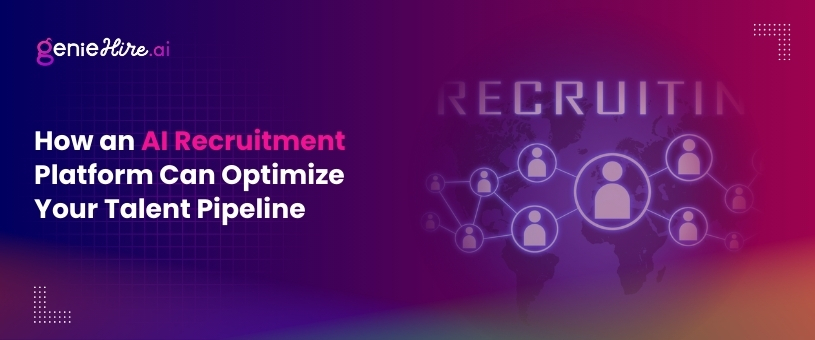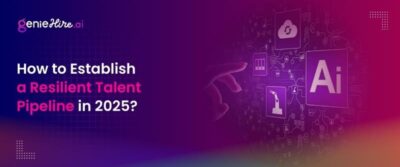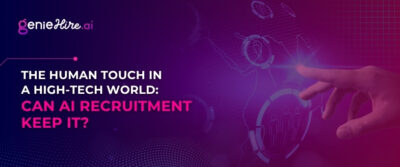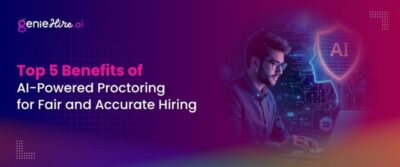Building a great team starts with great recruitment, which is the foundation of any successful business. However, for many companies, hiring still feels like a lengthy, complex process filled with manual tasks and uncertainty. From screening hundreds of resumes to coordinating interviews, recruiters often find themselves overwhelmed by repetitive processes rather than focusing on engaging with the right talent.
This is where an AI recruitment platform can transform the game. By combining automation, data-driven insights, and predictive analytics, AI helps optimize the talent pipeline, making hiring faster, smarter, and more reliable.
What is an AI Recruitment Platform?
An AI recruitment platform is a technology-driven system that uses artificial intelligence to support the hiring process. It doesn’t replace recruiters; instead, it helps them make better decisions. AI platforms are designed to analyze resumes, shortlist candidates, conduct assessments, and even forecast future workforce needs.
The result is a streamlined recruitment pipeline where human recruiters can focus on strategic decision-making while AI handles repetitive, time-consuming tasks.
Key Features of an AI Recruitment Platform
An effective AI recruitment platform comes with features designed to enhance every stage of hiring:
Bulk Resume Screening
AI tools can quickly sort through or screen thousands of resumes in no time, automatically finding the right skills, experience, and qualifications needed for a job. This saves a lot of time and helps hiring managers find the best people faster. Unlike manual screening, which often misses hidden talent due to human fatigue or bias, AI ensures that no qualified candidate is overlooked.
Intelligent Skill Matching
These platforms don’t just look at keywords; they analyze skills in context. For example, a candidate who has worked in multiple industries may bring transferable skills. AI matches not only the technical requirements but also potential and cultural fit, ensuring better job-role alignment.
Automated Interview Scheduling
Coordinating interviews across busy calendars is one of the biggest pain points for recruiters. AI automates this process by syncing schedules, suggesting available time slots, and sending reminders to both candidates and interviewers, saving time and improving candidate experience.
AI-Powered Assessments
Beyond resumes, AI platforms can conduct online assessments, coding tests, or even video interviews. They analyze communication, problem-solving, and technical skills, providing recruiters with a complete picture of a candidate’s abilities.
Candidate Reports and Insights
Every candidate is more than just a resume. AI generates detailed reports highlighting strengths, weaknesses, communication style, and cultural fit. These insights help recruiters make confident, evidence-based hiring decisions.
Predictive Hiring Analytics
The real strength of AI lies in foresight. By studying hiring trends, employee performance, and market demand, AI platforms can forecast future skill shortages. This helps businesses build a proactive talent pipeline instead of reacting to immediate needs.
Advantages of Using an AI Recruitment Platform
Faster Time-to-Hire
Speed is critical in recruitment. Top candidates often get hired in about 10 days, but older hiring methods can take weeks. AI reduces manual screening, scheduling delays, and repetitive tasks, allowing companies to close positions quickly and secure the best talent before competitors do.
Improved Quality of Hire
AI hiring platforms look beyond keywords in resumes. They analyze skills, work history, and even behavioral indicators to match candidates with the right roles. This increases the chances of long-term employee success, reducing turnover and rehiring costs.
Lower Hiring Costs
Every day a position stays vacant, businesses lose productivity and money. With AI reducing dependence on external agencies, optimizing processes, and speeding up decisions, the cost per hire significantly decreases. Over time, this translates into measurable ROI for organizations.
Enhanced Candidate Experience
Candidates often drop out of the process because of poor communication or delays. AI ensures timely updates, personalized messages, and quick scheduling, creating a smooth experience. A positive hiring journey also improves employer branding, making candidates more likely to reapply or recommend the company.
Reduction in Hiring Bias
Unconscious bias in hiring based on gender, age, or background can limit diversity and innovation. AI recruitment platforms are built to judge candidates fairly, looking only at their skills and qualifications.
While the technology must be carefully monitored, it helps organizations build fairer and more inclusive workplaces.
Scalability for Mass Hiring
Whether it’s hiring for 20 positions or 2,000, AI ensures processes remain consistent and efficient. This scalability is especially useful for industries with seasonal hiring spikes, such as retail, hospitality, or healthcare.
Challenges in AI Recruitment
While the benefits are clear, AI recruitment platforms also come with challenges that organizations need to understand and manage carefully.
Data Bias and Fairness
The performance of AI systems completely depends on the quality of the data they learn from. If past recruitment data includes details such as candidates from certain universities or locations, the AI might repeat the same pattern.
The key is to train AI on diverse, representative datasets and continuously monitor its outputs to ensure fairness.
Maintaining the Human Touch
Recruitment is ultimately about people, and too much automation can make the process feel cold and impersonal. Candidates value human interactions, especially when discussing career goals or negotiating offers.
The best approach is to let AI handle repetitive tasks while recruiters focus on meaningful conversations and relationship-building.
Privacy and Data Security
Recruitment involves handling sensitive candidate information. Any misuse or breach of data can damage trust.
AI platforms must comply with global data protection regulations such as GDPR and ensure transparent communication about how candidate data is stored and used.
Over-Reliance on Algorithms
AI provides recommendations, not final answers. Over-dependence on AI could cause recruiters to overlook unique candidate qualities that don’t fit traditional patterns.
Human judgment remains essential for final decision-making, ensuring that the hiring process remains balanced.
The Bigger Impact: Future-Ready Hiring
AI recruitment platforms are not just tools; they’re strategic enablers for businesses that want to stay ahead in a competitive talent market. By automating repetitive work, improving accuracy, and providing predictive insights, they make recruitment more efficient and forward-looking.
Companies that adopt AI in recruitment are better positioned to:
- Build diverse, innovative teams.
- Prepare for upcoming skill gaps.
- Deliver a smoother, more engaging candidate journey.
- Scale hiring without sacrificing quality.
Conclusion
An AI recruitment platform has the power to reshape hiring pipelines by combining efficiency with intelligence. The advantages: faster hiring, reduced costs, improved quality, and better candidate engagement, make it an essential tool for today’s recruiters.
Of course, challenges like bias, privacy, and over-reliance need careful management. But when AI is used responsibly and balanced with human judgment, it creates the perfect blend of technology and empathy.
Organizations that embrace this balance will not only optimize their current recruitment process but also future-proof their talent pipeline in a world where skills and roles are constantly evolving.




